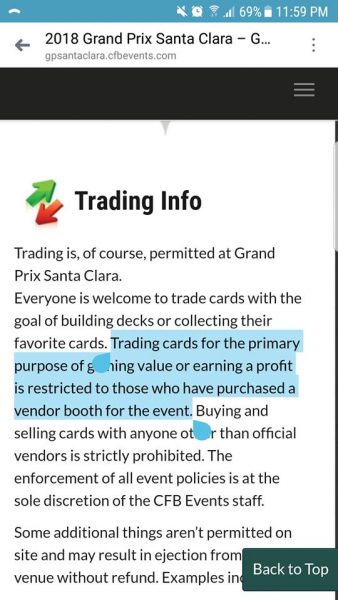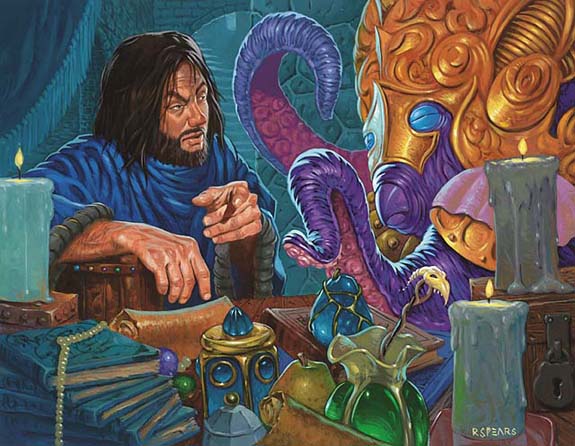Are you a Quiet Speculation member?
If not, now is a perfect time to join up! Our powerful tools, breaking-news analysis, and exclusive Discord channel will make sure you stay up to date and ahead of the curve.

The Good
I used to attend GPs to trade (not just for bulk rares, but to get older or obscure cards for my Commander decks) and to talk with other players. I switched over to buylisting to vendors for two reasons: 1) I have acquired a lot of bulk over the years buying collections, and I love filtering through it to sell all those hidden gems; and 2) Trading had gone pretty downhill the last few years, thanks in large part to everyone trying to value-trade everyone else. It used to be that you could attend a GP and find all kinds of different player types (kitchen-table casual, PTQ grinder, store owner, collector, foil fanatic, cube enthusiast, etc.) at the trade tables, but it seems that a lot of the more casual-style players have shied away from the trade tables because so many players were trying to "gain value" in every trade.
I'll honestly admit that I will likely check the trade tables out at the next GP I attend and see if things have changed and the "casuals" have returned. It would be nice to do some more trading.
Here's one of the major issues with trading these days: Most people seem to accept that if they are trying to trade a bunch of $3 to $5 cards for a $100 card they need to "overtrade" by some amount simply because the $100 card is likely a lot harder to get and the effort required by the person trading for the low-dollar cards to unload them is a very real "cost". On the other hand, asking for two $7 cards for a single $11 card does seem a bit unfair, given that the $11 card isn't likely all that much rarer than the $7 cards (based on the value) and the "cost of moving" two cards isn't that much higher than moving one card. And yet this is the type of stuff traders are up to in this day and age.
This new policy does clearly benefit the vendors (so if you're a vendor this is good). It will also remove some of the more toxic "value traders" from the environment (specifically the ones who prey on casuals and newer players). It is also hard to argue that it's more difficult to justify the cost of a vendor booth when one could simply be a trade table vendor without paying said fee (and just not being able to buy/sell cards), so eliminating this option may help justify the vendor booth rates.
The Bad
So having been on both sides of the table, I can definitely say that binder grinders/value traders fill a need. Vendors don’t have every card in stock at all times, and their buylist prices and trade-in values differ between them, so sometimes it's much easier to trade in to one entity who intends to separate everything out by vendor at the end of the weekend, so long as they provide fair prices on their trades. For example, say I have three $10 cards I want to trade into one $25 card;
- Vendor A is offering $6, $7, $8 for the 3 cards
- Vendor B is offering $8, $5, $9 for the 3 cards
- Vendor C is offering $7, $8, $7 for the 3 cards
I couldn't trade my three cards for the $25 card at any of those vendors without trading in additional cards (or paying cash). However, one might be able to find a "value trader" that would match the highest trade values in the room, which would be $8, $8, and $9, which equates to $25 and allows one to make the desired trade.
Now, that scenario does require a value trader willing to do that and for me to make sure I find the different values around the room to know that I should be able to get that. I'm definitely not saying all value traders would do this (I've seen plenty who don't care if a vendor is offering more on a card than they are), but I have definitely traded with some that do this.
CFB's new policy means there is less competition in the room for vendors, and it may cause some to be less aggressive with their buylist prices or trade-in credit because of this. While we don't know CFB's reasoning for the change; the fact that they jacked up the booth prices for vendors and then issued this policy (which heavily benefits the vendors) does seem like a way to alleviate the vendors anger over the new rates.
Another aspect that I don't know if CFB considered is that there are plenty of "value traders" who would trade all weekend and then head to the dealers before they leave and sell/trade in the cards they picked up. They basically acted like free agents who are only paid on commission (which is great for the vendors because it doesn't cost them anything). So these players won't be able to supply the vendors with a large option on Sundays that many of them might have gotten used to having.
The Ugly
One of the biggest challenges with this policy is it's enforcement. There is no definition for what constitutes "gaining value," so it appears that it's completely subjective and up to the whim of the CFB event staff.
As long as I've been playing Magic, people have been "trading down" more expensive cards for a larger number of cheaper cards with the expectation that the smaller cards will gain additional over time . This was often a great way for store owners to move really expensive cards that their local playerbase didn't want or couldn't afford (like Power) into cards they could move. It was also a great way for players to complete their sets of Power/duals/etc. by providing a clear benefit to the person trading off the Power or dual lands. The ambiguity of CFB's new policy may make these types of trades much more difficult.
I think a good analogy for this policy is like driving on a road on which you see no speed limits posted. If most roads are 45 to 50 MPH, then if you're driving around that limit, you are probably not speeding. If you are driving 100 MPH, then you almost assuredly are speeding, and if you're driving 10 MPH, you're assuredly not speeding. This ambiguity will make trading more difficult, as players will try to get as close to even as possible, which might make some trades fall through, as whoever would come out ahead wouldn't want to get kicked out of the event by CFB event staff.
Conclusion
Reading through numerous comments on various Magic Facebook pages, this new policy has gotten a lot of mixed reviews. Obviously, value traders themselves are very upset (in fact, I know of at least one person whose livelihood was based on this, so I'm not sure what he'll do now). Then there were players who were tired of always trying to get valued traded who applaud the change. And lastly, plenty of players fall in between, seeing both the merits and downsides of this policy. I fall into the latter category currently, though as I stated earlier, I want to actually go to a GP and see the results of this new policy.
What do you think of this turn of events?






Let me connect the dots a little here. I think the decline of the friendly trading atmosphere at GPs as you’ve described is a tangible loss for the atmosphere and overall GP experience. If this policy is an attempt to help restore that atmosphere, then all power to CFB.
On the other hand, these types of decisions might have unintended consequences, as you’ve outlined. If the policy discourages the value traders who end up buylisting with the vendors, the vendors could find the change a net negative as they lose a source of supply.
Overall I don’t really care personally as I don’t trade in paper, but I like a vibrant atmosphere where players can freely trade, even wheeling and dealing as they seek to trade up to something they want.
Definitely agree with you Matt. As I stated I tried to remain objective and I think it’s important to see how these changes actually effect the GP experience before passing any sort of judgement (and it may actually take a few GPs for things to develop).
Honestly, I’m not sure how is really going to change much as the enforcement of this seems difficult. Event staff don’t have enough time to wait around long enough watching a trade to determine whether or not the two people are “value” trading or whatever. The only actual thing I can think of for this to affect is that people with a lot of trade binders may be kicked out. But there has been the excessive trade stock rule around for awhile as well so it just seems like a clusterf@*% to enforce this sort of thing.
Let’s hope this is more of a verbal warning, because while I don’t really value trade, I would definitely be that guy getting/giving extra for the 100 dollar card because I’m not an idiot. Hell, I devalue standard stuff trading into modern stuff and I think most people would as well. Is it value trading? I think it’s just common sense…